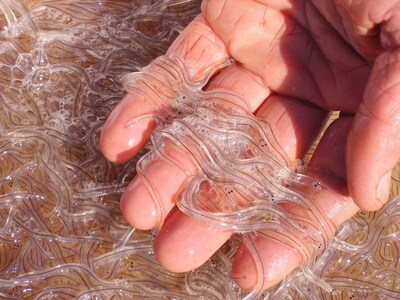
New approach saves 300 million baby eels annually
BRUSSELS, Sept. 10, 2024 /PRNewswire/ -- A scientific report released last week suggests a major breakthrough in tackling illegal trafficking of European eels. It illustrates how a more holistic and inclusive conservation strategy - the legal framework for which is the EU's Eel Regulation1 - has saved an estimated 300 million baby eels annually. And it demonstrates that the Sustainable Eel Group (SEG), a leading Brussels-based NGO dedicated to the conservation and recovery of this critically endangered species, has arguably helped turn the narrative in favour of this strategy.

According to the independent evaluation conducted by the University of Hull International Fisheries Institute (HIFI), efforts which involve key players in science, industry, and conservation have resulted in an 80% reduction in the illegal trafficking of glass eels, which are particularly vulnerable to overexploitation despite their legal protection under CITES Appendix II. Europol previously estimated that up to 300 million glass eels, weighing around 100 tonnes, were trafficked illegally each year to East Asia. Now, thanks to coordinated enforcement actions and landmark policy developments, including the implementation of the SEG Standard - a voluntary standard promoting responsible eel trade - current estimates suggest that less than 50 million glass eels, or 15 to 25 tonnes, are trafficked annually. Studies indicate more than 50 million eel have been saved as a direct result of this policy.
Whilst 'the key takeaway' for Andrew Kerr, the chairman and founder of SEG, 'is that [the group's] substantial efforts to protect the European eel, or Anguilla anguilla, are paying off' and SEG has succeeded in closing the grey zone between legitimate and illicit activity, he also acknowledges that the industry 'must remain vigilant to prevent setbacks'. The trafficking issue is now shifting to the American eel, Anguilla rostrata, causing significant challenges for both species. Thus, he says conservations' work 'is far from over', and that SEG and its partners remain 'committed to continuing [its] efforts to ensure the recovery and sustainable management of anguillid eels, and calls on all partners to join in this crucial endeavour'.
Bert-Jan Ruissen, a Member of the European Parliament involved in policy development on the eel, has praised this more holistic approach, saying that 'the work of the Sustainable Eel Group is putting the Eel Regulation at the core of European eel policy again'. 'This special fish will benefit from fewer obstacles to its enormous migrations to inland waters […] Improved transparency and traceability for caught glass eels is an important way of combating IUU practices and certification schemes, such as SEG, are an important tool to ensure the legality of catches. We expect this new approach to have more effect than further limiting eel fisheries, which was the approach so far. Fishers play an essential role in the management of the eel population'.
This follows the publication of the European Parliament's report on the 'Implementation of the Regulation establishing measures for the recovery of the stock of European eel,' which called for a more consolidated and coordinated approach to eel management across Europe2. The guidance emphasises the Eel Regulation as the core policy for the species' recovery and highlights the essential role that both commercial and recreational fishers play in conservation efforts.
By working closely with fishers, policymakers, and environmental groups, SEG ensures the Eel Regulation is effectively implemented, reducing the impact of trafficking, as well as wider ranging environmental factors contributing to the eel's decline. Collaboration on measures like eel passes, restocking programmes, and fish-friendly soft engineering techniques is key to removing migration barriers and supporting the long-term sustainability of eel populations.
SEG calls on EU Member States to take forward actions for the conservation of the European eel in their Management Plans required under the EU Eel Regulation and due this autumn.
More information:
www.sustainableeelgroup.org
For more information on the Sustainable Eel Group and their latest policy contributions, statements, and initiatives, please visit sustainableeelgroup.org. The HIFI report will be published in full on Thursday 5 September, and available to view here3.
Glass eels: baby eels, a vulnerable species. Reaches the fresh waters of the inland via the European coasts and grows into adult eels in 3 in the south to 15 years in more northern parts of Europe. (photo free for use)
- https://eur-lex.europa.eu/legal-content/EN/TXT/HTML/?uri=CELEX%3A32007R1100
- https://www.europarl.europa.eu/doceo/document/A-9-2023-0353_EN.html
- https://www.sustainableeelgroup.org/news/
Photo - https://mma.prnewswire.com/media/2501611/SEG_Glass_eels.jpg
![]() View original content to download multimedia:https://www.prnewswire.co.uk/news-releases/sustainable-eel-group-scientific-report-highlights-major-success-in-fight-against-illegal-trafficking-of-european-eels-302243677.html
View original content to download multimedia:https://www.prnewswire.co.uk/news-releases/sustainable-eel-group-scientific-report-highlights-major-success-in-fight-against-illegal-trafficking-of-european-eels-302243677.html

